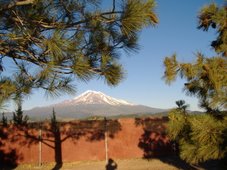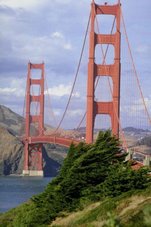After citing some significant factors about the state: "California is the seventh largest economy is the world with a GNP of $1.62 trillion dollars." from Libertarian blogger Ron Getty. That's one thousand, thousand, millions... A lot of zeros and a number too huge to visualize in my checking account.. "CCalifornia has 16 million more people than Australia"... That's even more people than Canada... Zero Population Growth (ZPG) was a good idea for a while but human nature, and California beach bodies, just overwhelmed it...
Probasco then cites some trends that seem disturbing for California and probably will be soundly rejected in Omaha:
Citing the SFChronicle's Carolyn Jones report on Measure G, Berkeley's wish to reduce the whole city's greenhouse emissions by 80% by 2050
In Berkeley's green future, there will be no incandescent lightbulbs, Wedgewood stoves or gas-powered water heaters. The only sounds will be the whir of bicycles and the purr of hybrid cars -- and possibly curses from residents being forced to upgrade all their kitchen appliances.
Some measures will be popular and easy, like a car-share vehicle on every block and free bus passes. But others will be bitter pills, such as strict and costly requirements that homes have new high-efficiency appliances, solar-powered water heaters, insulation in the walls and other energy savers.... To reach an 80 percent reduction, sacrifices would have to be made in all quarters of the city.
Under the emissions crash diet, builders will use only recycled and green materials. Residents will be told exactly how many carbon units they're generating based on the cars they own, the distances they drive, the waste they generate and the energy they consume. Landlords will be required to provide free bus passes to tenants.
Berkeley's green blueprint calls on people to take small steps on a daily basis as well. Incentives and legislation will make common many activities only a few practice now -- walking to work, using cloth shopping bags, buying locally grown produce, shutting off appliances and reducing their use of nonrecyclable packaging.
People are willing to make these lifestyle changes, and the cumulative effort will add up. It's not rocket science. We can do this."
While virtually everyone in Berkeley agrees that reducing greenhouse gases is a worthy goal, not everyone agrees on the process.
Former Mayor Shirley Dean questioned whether the city's enthusiasm has eclipsed its common sense.
Dean supports many of the ideas Bates has put forth, such as solar water heaters, but wonders how many of the ideas would be funded, especially when Berkeley residents already pay some of the highest taxes in the state. She also notes that the city's method of tabulating emissions seems "fuzzy."
The city is omitting Interstate 80, UC Berkeley and Lawrence Berkeley National Laboratory from its calculations because those are controlled by state agencies that have their own, and in some cases tougher, greenhouse gas reduction plans, DeVries said.
The city also is counting emissions reductions that occur far outside city limits, such as reductions from PG&E plants and garbage dumps.
... the accounting details are irrelevant, said Dan Kammen, a professor at UC Berkeley's Energy and Resource Group.
"Berkeley is one of the first cities to do this, and I think they're entitled to some creative bookkeeping," he said.
Probosco continues...
Then there’s San Francisco, where animal cruelty laws dictate—another despicable word—that dog “guardians” serve their pets water in a “nonspill bowl in the shade. Their food must be wholesome, palatable and sufficiently nutritious,” which leads me to ask, ‘what makes dog food wholesome?’ and, ‘sufficiently nutritious by whose standards?’ And I also wonder, ‘how would you know whether the food was palatable to your pet or if it—excuse me, s/he--was just really hungry? Would you consult a pet psychic?
See Probosco's article on the requirements to become a licensed SF Dog Psychic.
San Francisco’s Board of Supervisors banned smoking in all open spaces owned by the city--except for golf courses, initially, because golfers contribute greens fees to the city, while the rest of the smoking rabble do not. Realizing how that made them look, they have now kicked smokers off the greens as well.Many business and products in California have Proposition 65 warning labels affixed to them, warning the ever-unsuspecting public of the dangers of grocery produce, nail polish, solvents, oil, gasoline, you name it. Businesses which fail to post the proper signage can face fines of $2500 per day. Freelance journalist Donald Melanson noted the following label on his computer’s mouse:
“The cord on this product contains lead, a chemical known to the State of California to cause cancer and birth defects or other reproductive harm. Wash hands after handling.”
And finally, there’s a few nanny-state laws lately considered by the State Legislature, as related by San Diegan Adam Summers an economist and policy analyst for the Reason Foundation:
• AB 722—Would “phase out” the sale of incandescent light bulbs in favor of more energy-efficient fluorescent bulbs (despite the fact that harmful levels of mercury from fluorescent bulbs can add up in landfills, contaminating the soil and making their way into the food supply). This bill has been amended so that now, instead of banning bulbs outright, it would have the State Energy Resources Conservation and Development Commission set a minimum energy efficiency for bulbs. A nice P.R. move that would, in practice, essentially ban incandescent bulbs.
.... Summers and Smith-Heisters, however, believe that lawmakers will use global warming to justify the next wave of overly-restrictive laws, nanny and otherwise. According to an article by the San Francisco Chronicle’s Mark Martin, California Attorney General and former Governor Jerry Brown is using AB 32, the California Global Warming Solutions Act of 2006, to stick a wrench into San Bernardino County’s 25-year growth plan. Brown is suing the county because several developments on the drawing board don’t even consider smart growth as a way to minimize global warming. And he warns, “This is just the preliminary step in the turbulent waters of AB 32.”
• SB 7—Would ban smoking in a vehicle--moving or stationary--in which there is a minor.
• AB 86/AB 90/AB 97/SB 490—Would restrict the use of trans fats in restaurants and school cafeterias.
• SB 120/SB 180—Would require caloric, trans fat, saturated fat, and sodium content information to be printed on restaurant menus.
• AB 1634—Would require dog and cat owners to spay or neuter their animals by four months of age.
Santa Rosa resident Skaidra Smith-Heisters, also of the Reason Foundation, points out that such laws are not unique to California. New York City has already banned trans fats. It was the first city in the nation to ban talking on cell phones without a headset while driving. “Cultural norms differ from state to state,” she says, “but the underlying attitude is more pervasive than one might first imagine.” However, “What is perhaps different about California is that politicians and voters are not shy about approving radical laws.It’s hard to argue against cleaner air and water and voluntary measures to reduce greenhouse emissions, but no politician ever wants to stop there. Just as much as they fear the erosion of rights under the twin wars on terror and drugs, those of a libertarian bent also fear the totalitarian implications of a looming environmental crusade, as evidenced by the extreme measures taken in Berkeley. Or course, in the case of global warming, the whole world is at risk. But the world has been at risk many times before, from hellfire and dysgenics, fascism, communism, capitalism, global cooling, terrorism, and Wal-Mart. The leaders of the crusades against each threat believed they had the facts on their side, and in each case, except Wal-Mart’s, part of the ‘solution’ lay in trampling citizen’s rights.
Back in 1909, California progressives enacted a eugenics program which resulted in the forced sterilization of 19,000 people. Oliver Wendell Holmes, reviewing the case of the “socially inadequate” Carrie Bell, in the landmark Buck v Bell, concluded that “her welfare and that of society will be promoted by her sterilization.” That makes the California eugenics statute a “nanny law.” In light of that misstep alone, you would think that Californians would be eager to enact legislation which severely curtailed the powers of their own government, and meted out harsh penalties to overbearing moralists. But the opposite is true.
The real question for everyone, including our latest batch of Presidential wanna-bees mostly of the Democrat Stripe, but with a few Republicans and lots of feel-good-NGO's is: WHAT IS THE LIMIT OF GOVERNMENT INVOLVEMENT?...
Where is the line? When does too much become enough?... The Constitution states that those rights not specifically delegated to the federal or state reside in the individual.. It sure doesn't seem that way.. Our rights to live in peace and freedom are being encroached upon by the those who start out saving the few and weak and then grow to include everyone... When do we stop allowing people to decide our livelihood, live style, health habit choices and .....? Well, what is your boundary?
Singapore has prospered under the guidance of Lee Kuan Yew.... IS that our future? Over the years he has dictated many laws and rules that have encroached upon the private rights of the people. His criminalizing possession of chewing gum and arrests for "Public Display of Affection". (PDA). are but a few examples... Of course, he also restricted the press and carefully controlled the public image of Singapore and him and his family... Do we really need a dictator, even a benevolent one? Would the NYTimes, WashPost, SFChronicle, LATimes and the electronic news outlets continue to prosper or be forced to bend to the whims..?
"I beseech you, in the bowels of Christ, think it possible you may be mistaken." Oliver Cromwell said that long ago...... It applies to many of our legislators, politicians and cultural Thought Leaders... Who will speak this truth to their power?



No comments:
Post a Comment